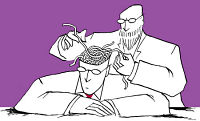Indexes - all Resources

Welcome to our new-look website. (2014)
If you’ve just started exploring hubris, you’re in the right place. If you previously visited the Daedalus Trust’s old site, you’re also in the right place but you'll need to remember to bookmark our new address - www.daedalustrust.com (the old .org.uk site will disappear shortly).
"Iraq war shows how an inner circle that becomes a cabal will confirm what CEOs think they know."
Andrew Hill.
ft.com 11 July 2016.
It should come as no surprise that the uniquely perilous situation described in the (Chilcot report on the Iraq war) has parallels in, and lessons for, the corporate world.
(Chilcot’s) report advocates wider and deeper discussion in cabinet and committees, separation of risk assessments ... Written by: Hill, Andrew; Financial Times, The. "...the link between CEOs’ disaster experience and corporate policies has real economic consequences on firm risk and its cost of capital."
Bernile, G., Bhagwat, V., Rau, P. R.
The Journal of Finance, 72(1), 167-206
Image: Bureau of Land Management / Wikimedia Commons
"There is a growing consensus that CEOs’ past experiences in life account for much of the variation in corporate risk-taking... Written by: GENNARO BERNILE, VINEET BHAGWAT, P. RAGHAVENDRA RAU "This study explores the potential benefits of executive hubris to firm innovation. Both studies render robust support to the authors’ main theoretical prediction - that executive hubris is positively related to firm innovation.
Yi Tang, Hong Kong Polytechnic University
Jiatao Li, Hong Kong University of Science and Technology
Hongyan Yang, Hong Kong Polytechnic University.
Read more
“Women leaders will do a great service by declining to adopt the worst male leadership traits.”
Jennifer Kenny.
WMBnow 11 July 2016.
“I was thrilled when Sarah Palin was selected by John McCain as the vice presidential candidate in the US 2008 Presidential elections… To me it signalled that women had arrived, we could now have incompetent women leaders - true equality as last!
“We have always had incompetent... Written by: Kenny, Jennifer. ….To believe one’s local leadership style is the only way to success is to embrace the narcissistic tendencies Freud warned us about.
Michael Sanger, Hogan Assessment Systems
Tomas Chamorro-Premuzic, Hogan CEO, Professor of Business Psychology at University College London & Columbia University.
Published in HQAsia, 27 May 2016
What kind of leaders do people love? Ones that look like them. As Freud noted, people ... Written by: Sanger, Michael & Chamorro-Premuzic, Tomas. “Leaders projecting strong power motivation are significantly more likely to have their time in office considered effective.
Samuel R. Rohrer, Department of Political Science and International Affairs, University of North Georgia, USA
Research and Politics October-December 2014: 1–8
Leadership Trait Analysis (LTA) criteria … “examine an individual’s underlying desire for power, the belief tha... Written by: Rohrer, Samuel R. "People in power are more engaged, optimistic and take more risks.... (But) having power clearly comes with a risk for corruption and self-serving behaviour."
Ana Guinote, University College London; Nova School of Business and Economics, Lisbon
The Conversation, 3 April 2017
Based on Guinote’s paper ‘How power affects people: Activating, wanting, and goal seeking’
Annual Review of Psychology, Volu... Written by: Guinote, A. "...For many men who score high on the harassment scale," the ideas of power and sex "...are often intertwined."
Wan, W. National Correspondent, US.
The Washington Post, 22 December 2017
Image: David Shankbone / Flickr (CC BY 2.0)
"The torrent of cases pouring out in new... Written by: William Wan "If Obokata hadn’t tried to be a world-beater, chances are her sleights of hand would have gone unnoticed…
John Rasko and Carl Power,
The Guardian 18 February 2015
“The spectacular fall of the Japanese scientist who claimed to have triggered stem cell abilities in regular body cells is not uncommon in the scientific community. The culprit: carelessness and hubris in the drive to make a historic discovery
“The y... Written by: Rasko, J and Power, C. Read more
What decision makers can learn from Blair’s failures. (2016)
What doesn’t kill you will only make you more risk-loving: early-life disasters and CEO behaviour (2017)

What I see, what I do: how executive hubris affects firm innovation. (2012)
What is leadership competence for women? (2016)
What kind of leaders do people love? (2016)
What makes a Prime Minister great?: A Leadership Trait Analysis of the effectiveness of British Prime Ministers from 1902 to 2004. (2014)
What makes powerful people tick? (2017)
What makes some men sexual harassers? Science tries to explain the creeps of the world (2017)
What pushes scientists to lie? The disturbing but familiar story of Haruko Obokata. (2015)













